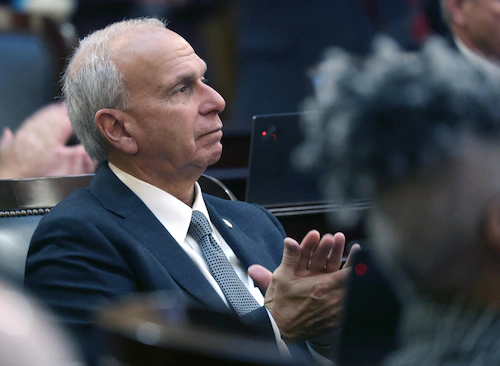Rotunda Rumblings
Breaking bonds? While the House-passed state budget plan would authorize $600 million in bonds to help build a new Cleveland Browns stadium, the Ohio Senate might end up favoring a hybrid plan that combines stadium bonds with Gov. Mike DeWine’s plan to fund stadium projects by raising the state tax rate on sports-betting companies. As Jeremy Pelzer and Anna Staver report, senators haven’t yet decided which stadium-funding plan – if any – to support, but some Republican senators said they’re sympathetic to DeWine’s goal of creating a permanent source of revenue for stadium projects, rather than approving a one-off bond issuance for the Browns.
Signed, sealed, delivered: Youngstown State professors delivered about 4,500 signatures and a summary for repeal language to Senate Bill 1, the controversial higher education bill. The professors hope to get a referendum on Nov. 4 ballots. The summary and 1,000 signatures of valid Ohio voters begins the long and expensive process, which will include gathering hundreds of thousands more signatures to qualify for the ballot, Laura Hancock reports.
In the books: Colleges and universities are opposed to an Ohio House bill that would require colleges in some cases to buy textbooks for the courses they offer through College Credit Plus, the state’s dual enrollment program for students in grades 7-12. Currently, school districts pay for the textbooks, which they say is expensive. The formula for tuition rates would also change, Hancock reports.
Off the government’s CHEST: A federal prosecutor is accusing a scientific journal edited by a Cleveland Clinic physician of “partisan” scientific bias and seeking answers to a series of misinformation-related questions, Sabrina Eaton writes. An April 14 letter from the interim U.S. Attorney for the District of Columbia, Edward R. Martin, Jr., asks the Cleveland Clinic’s Dr. Peter Mazzone, who edits the American College of Chest Physicians’ journal CHEST, to provide answers by May 2. Martin’s letter was published on social media by Chicago-based psychiatrist Eric Reinhart, who accused the Trump administration of using U.S. Attorneys to intimidate academic journals.
Custody battle: The Ohio Supreme Court will consider a custody battle between two gay women who began raising children together before a landmark U.S. Supreme Court case legalizing gay marriage in 2015. The women split up and are asking the court to settle a custody dispute. As Laura Bischoff of the USA Today Network Ohio Bureau reports, the case has drawn some national attention given its implications of rights under the U.S. Constitution and a state law that recognizes consenting husbands as fathers of children produced via artificial insemination.
RIP: Former state Rep. Ron Hood died last Saturday at the age of 55, according to the Pickaway County Republican Party. The Circleville Republican, who served for a total of 16 years in the Ohio House across three decades, was a strong opponent of abortion, cosponsoring the state’s 2019 “heartbeat bill” that generally banned abortions after about six weeks into a pregnancy (the law was overridden with the passage of an abortion-rights constitutional amendment four years later). After leaving the legislature in 2020, Hood ran unsuccessfully for Congress in 2021 and for Ohio governor in 2022.
Hard pass: House Speaker Matt Huffman has come out against a push by the Cincinnati Bengals and Hamilton County officials for state lawmakers to provide $350 million to help renovate Paycor Stadium. “I don’t support that. I don’t think the public supports it,” the Lima Republican told WLW-AM’s Bill Cunningham. Huffman added that he might change his mind if “the taxpayers are held harmless or make money,” as he asserted would be the case under the Cleveland Browns’ plan for lawmakers to approve $600 million in state bonds for a new stadium in suburban Brook Park.
Four Questions for Alex Gibney
HBO last week released a new, two-part documentary series on money in politics. Part one features Ohio’s own former Speaker Larry Householder, now convicted on what amounted to a charge of accepting the biggest bribe in state history. Jake Zuckerman caught up with Gibney to chat about the film. You can read the full interview here or the abridged version below.
What came first – a project about money and politics? Or Larry Householder?
The project about money in politics. We were looking for a story to carry the weight of the subject, and Jane Mayer [investigative journalist and author of “Dark Money: The Hidden History of the Billionaires Behind the Rise of the Radical Right”] tipped us off to this story. And the more we dug in, the more we believed it was essential to him.
What do you make of the accidental or haphazard origins of the FBI’s investigation?
One of the critiques I would have expected of this film is that, ‘What are you talking about that bribery is a problem? Here’s a case where some bad guys did some bad stuff and they got caught and they got sent to prison. So what’s your issue?’
My issue is that it’s a miracle that they got caught, really, because the FBI was actually pursuing a completely separate investigation.
Some of Larry Householder’s people make this point that they weren’t doing anything that everybody else isn’t doing, and in some ways, your documentary almost agrees with that in saying this is politics. Does that suggest that Larry has almost been treated unfairly?
No.
Yes, it’s true to some extent that Larry Householder is doing what other people do. And if everybody had been as reckless and as, frankly, dumb as Larry Householder had been, they might have gotten caught as well. But it’s the system, that’s the problem here. And I would say the problem is not that Larry Householder is being treated unfairly.
The problem is we’ve created a system in which other people like Larry Householder are able to get away with it all the time. And it’s only in the rare case that somebody like Larry Householder and Matt Borges [a Householder co-defendant serving five years in prison] are caught.
What do you make of the lack of political blowback in Ohio about the scandal?
I don’t know really how to explain it.
There was one hopeful sign which we indicated, I think in the crawl at the end, which was a popular referendum to overturn the heartbeat bill. That was one instance in which, you know, the people’s voice was heard. The majority ruled. But the system now in Ohio seems so rigged against the popular will, against democracy. It is a problem, but the people don’t seem to be upset enough about it.
On the Move
WOSU’s Mike Thompson ran very fast in the Boston Marathon on Monday, finishing in less than 3 hours and 22 minutes.
Birthdays
Sam Rossi, formerly the Ohio treasurer’s office communications director and now a senior account executive at Lesic & Camper Communications.
Straight From The Source
“Moreover, the magistrate concluded, and this Court agrees, that the plaintiff is entitled to disgorge all profits that Lager received from the contracts that this Court has determined are void and unenforceable, and that a constructive trust should be imposed over Lager’s property.”
– Franklin County Judge Kimberly Cocroft in an order upholding a magistrate’s ruling and granting the state’s request to block Bill Lager, founder of the now-shuttered ECOT online charter school operation, from disposing of any assets while the drawn-out litigation continues over an unresolved $160 million recoupment order.

